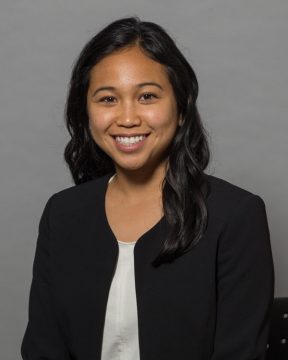During two exciting years as a Howard Hughes Medical Institute (HHMI) Research Fellow, Alyssa Flores ’21 immersed herself in translational research in the lab of Nicholas Leeper, MD, director of vascular research and chief of vascular medicine at Stanford University; was lead author of a paper published in the journal Circulation; and had lunch with a Nobel Laureate.

Now back at Geisel, Flores is lead author of a new paper published today in the journal Nature Nanotechnology. The study targets a specific cell line to prevent atherosclerosis. In the immune system, macrophages—a type of white blood cell—engulf and digest cellular debris but their ability to recognize and clear diseased cells appears to become defective in atherosclerosis. Flores and a Stanford-based research team designed a nanoparticle that delivers a therapy selectively to macrophages, reactivating them so that they can phagocytose—eat up—diseased cells. Using the mouse model, their findings lay out evidence that macrophage-specific nanoparticles act as a precision medicine, carrying their therapy to reduce plaque in diseased arteries. These benefits occurred without inducing any off-target toxicities in the mice—suggesting that this approach could be safe and effective.
Atherosclerosis is a chronic inflammatory disease that if untreated can lead to heart attack, heart failure, and stroke. “We have millions of cells in our body that turn over each day, so our body has a natural way of clearing out these cells. When this process goes awry, we can develop a build-up of diseased cells that lead to plaques in the arteries, which ultimately cause heart attack and stroke,” Flores says. “Using a precision medicine concept, we reactivated macrophages’ ability to recognize dying cells as a disease, and essentially take out the trash.”
This study also used single-cell RNA sequencing, an advanced technique to analyze gene profiles following treatment. Their analysis revealed that treatment decreased inflammatory genes in macrophages—implicating this approach in resolving the inflammation known to drive cardiovascular disease. They suggest future studies should address whether such therapies may promote plaque stabilization, and whether the drug delivery platform could be adapted as a therapy for cancer and other inflammatory diseases.
Long interested in atherosclerosis from both a scientific and clinical perspective, Flores plans on becoming a vascular surgeon. The specialty, she says, embraces innovation to advance the treatment of vascular disease and often manages complex patients with multiple comorbidities. The future physician-scientists says, “Returning to clinical work, I have a new perspective on the many ways we can help patients—both in the lab and at the bedside. I am grateful to HHMI, to Geisel, and to Stanford for supporting me as I learned new skills, honed my interest in vascular surgery, and developed professionally.”